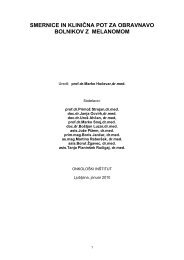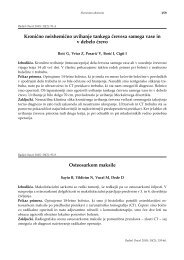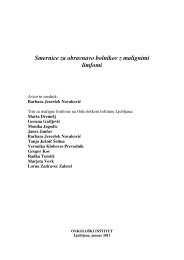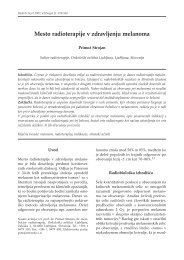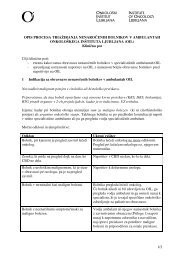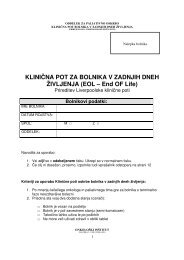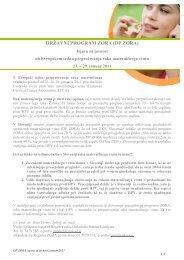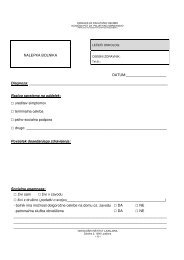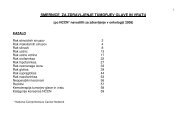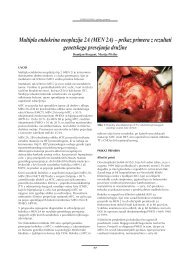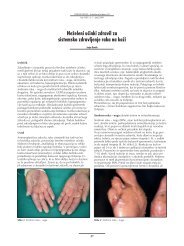You also want an ePaper? Increase the reach of your titles
YUMPU automatically turns print PDFs into web optimized ePapers that Google loves.
Markers predicting clinical outcome in breast cancer patients treated<br />
with anti-estrogen therapy: towards the identification <strong>of</strong> biologically and<br />
clinically relevant information<br />
Maria Grazia Daidone, Danila Cordini, Valeria Musella, Loris De Cecco, Maya Fedeli,<br />
Manuela Gariboldi, Patrizia Miodini, Vera Cappelletti, Marco Pierotti<br />
Foundation IRCCS – National Institute <strong>of</strong> Tumors, Milano, Italy<br />
In estrogen receptor positive (ER+) breast cancer patients, the identification <strong>of</strong> molecular<br />
markers predictive <strong>of</strong> early relapse following anti-estrogen treatment still represents an<br />
investigational open question. We evaluated the expression <strong>of</strong> RERG (Ras-related, estrogenregulated<br />
and growth-inhibitor, a unique estrogen-dependent regulated protein belonging<br />
to the Ras superfamily <strong>of</strong> GTP-binding proteins) by quantitative real-time-PCR in 113<br />
ER+ primary breast cancers from patients subjected to surgery and adjuvant tamoxifen,<br />
and investigated its relationship with some patho-biological factors (including tumor<br />
size, grade and histology, lymph node involvement, ER and progesterone receptor [PgR]<br />
levels) and biomarkers indicative <strong>of</strong> a typical luminal phenotype (GATA3) or known to<br />
be associated with tamoxifen resistance (HER-2/neu and PTEN). RERG expression was<br />
significantly associated with hormone-related factors: in fact, it was positively correlated<br />
with both mRNA and the corresponding protein level <strong>of</strong> ER and PgR and with GATA3,<br />
which codes for a transcription factor recently shown to be involved in the positive<br />
regulation <strong>of</strong> the expression <strong>of</strong> ERS1 gene in a cross-regulatory feedback loop. Conversely,<br />
no association was found between RERG and PTEN or HER-2 mRNA expression, thus<br />
indicating an independence <strong>of</strong> molecular mechanisms <strong>of</strong> cell response to hormones and<br />
anti-hormones involving these genes.<br />
Follow-up analysis indicates that reduced RERG mRNA expression was present in<br />
tumors from women that will develop relapse compared to those long-term disease-free.<br />
The association <strong>of</strong> RERG expression with patients outcome was independent <strong>of</strong> the<br />
most important patho-biologic features <strong>of</strong> prognostic relevance following anti-estrogen<br />
treatment: lymph nodal<br />
l4<br />
involvement, PgR status and ER content. In a multivariate Cox’s<br />
proportional hazard regression analysis a low RERG expression was a significant predictor<br />
<strong>of</strong> relapse occurrence (hazard ratio [HR] for low versus high 2.084, 95% confidence<br />
interval [CI] 1.092-3.979, P=0.026), similarly to GATA3 expression (HR for low versus<br />
high 2.570, 95% CI 1.301-5.077, P=0.0066). Conversely, HER-2 and PTEN failed to<br />
provide prognostic information. Low expression <strong>of</strong> RERG associated with low GATA3 in<br />
PgR-negative tumors identified patients with the worse prognosis, even after adjustment<br />
for lymph node involvement and ER content.<br />
RERG contribution to anti-estrogen cell response was also supported by in vitro data.<br />
In fact, in MDA-MB361 and MCF7 cells, two ER-positive cell lines responsive to the<br />
antiproliferative effect <strong>of</strong> anti-estrogens, the growth inhibition by 4-OH-tamoxifen was<br />
paralleled by an increase in RERG mRNA expression while the lack <strong>of</strong> proliferative effect<br />
observed in ZR-75.1 was accomplished by a progressive down-regulation <strong>of</strong> the gene<br />
expression suggesting that RERG may be involved in mediating the growth-inhibitory<br />
18



